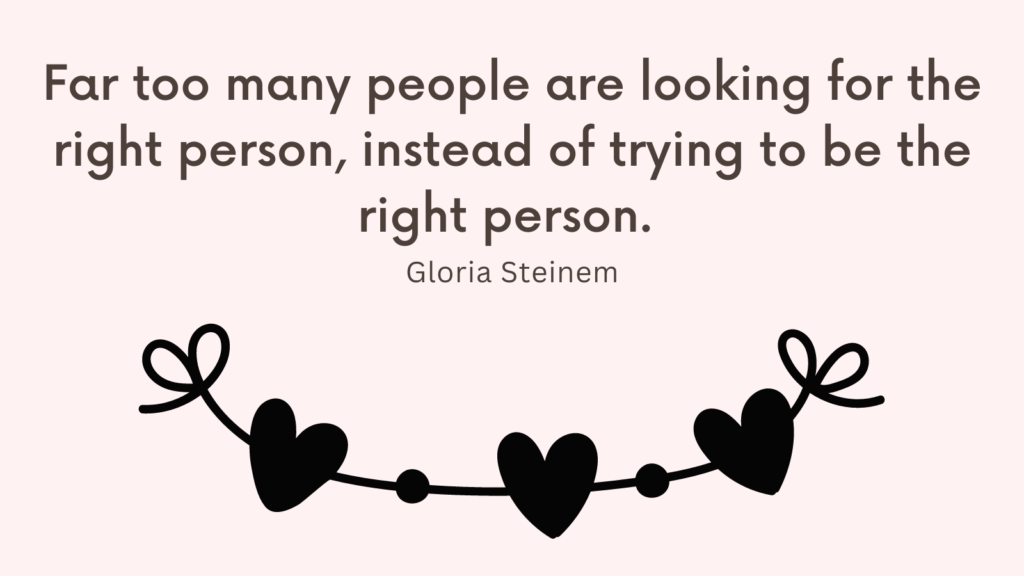In this post, you’ll learn all about the difference between conditional love and unconditional love.
- Conditional Love Meaning
- Unconditional Love Meaning
- Conditional Love vs. Unconditional Love
- Why People Engage In Conditional Love
- Types of Conditions Attached to Love
- The Impact of Conditional Love
- Breaking Free From Conditional Love – How To Practice Unconditional Love?
- What Makes a Relationship Healthy?
- FREE Relationship Worksheets PDF
- Conclusion
Conditional Love Meaning
Conditional love refers to love that is given or received based on specific conditions.
For example, if someone only loves another person as long as they behave in a certain way or meet certain expectations, this would be considered conditional love.
While some conditions are necessary for healthy relationships, too many conditions can create an unhealthy and unsustainable dynamic.
Related: Caregiving vs Caretaking (The Savior Complex)
Unconditional Love Meaning
Unconditional love refers to a type of affection or care that is given without any expectation of receiving something in return.
It is a selfless kind of love that is pure and does not depend on external conditions or circumstances.
Unconditional love is often associated with the love of parents for their children, as it is given regardless of their behavior or actions.
It can also be present in romantic relationships, friendships, and other types of relationships.
Unconditional love can provide a sense of security and comfort.
Conditional Love vs. Unconditional Love
Conditional love is based on specific criteria being met, while unconditional love is given without any expectations or conditions.
Conditional love is not healthy or sustainable.
True love is unconditional and based on genuine care, respect, and acceptance of the other person, flaws and all.
It’s important for individuals to recognize and challenge any tendencies towards conditional love, and instead work towards building healthy, authentic relationships built on mutual trust and respect.
Related: Codependency vs. Love (+Practical 8 Tips to Move From Codependency to Real Love)
Why People Engage In Conditional Love
People may engage in conditional love for a variety of reasons.
Some individuals may have learned to believe that love must be earned or that they are only lovable if they meet certain standards or expectations set by others.
Others may use conditional love as a way to control or manipulate their partner or to avoid vulnerability and intimacy.
There are also societal and cultural factors that can contribute to the prevalence of conditional love.
Messages in media and popular culture often promote the idea that love is something that can be transactional, based on external factors such as appearance, wealth, or status.
Related: Love Addiction Test (+ Resources For Love Addiction)
Types of Conditions Attached to Love
There are several conditions that may be attached to love, some of them are:
1. Reciprocity: This condition of love is based on the idea that one must receive as much love as they give.
2. Expectations: When we love someone, we may have certain expectations of how they should behave or what they should do for us. This can also create an imbalance in the relationship and lead to disappointment if those expectations are not met.
3. Possessiveness: Love can often lead to possessiveness and a need to control the other person. This can be harmful and lead to jealousy, insecurity, and mistrust.
4. Obligation: Sometimes, we may feel obligated to love someone because of our past or shared experiences. This can lead to resentment and a forced relationship that is not genuine.
Related: Top 5 Tips On How To Recover From Love Addiction
The Impact of Conditional Love
1. Impact On Relationships
When love is conditional, it often creates a sense of pressure on the person receiving it to constantly meet those expectations in order to feel loved.
This can lead to feelings of inadequacy or insecurity, as well as resentment or anger towards the person who is giving the conditional love.
Conditional love can also impact relationships is by creating a power dynamic, where one person has more control over the relationship than the other.
The person giving the conditional love may hold their partner’s emotional well-being hostage, using affection and approval as a means of control.
This can lead to feelings of suffocation, resentment, or even rebellion on the part of the person receiving the love.
Ultimately, relationships based on conditional love tend to be fragile and prone to collapse under the weight of unrealistic expectations and unmet needs.
In contrast, relationships that are built on unconditional love – where love and acceptance are given freely and without strings attached – are more likely to be resilient, supportive, and fulfilling for both partners.
Related: Top 8 Tips On How To Break Codependency In A Relationship
2. Psychological Effects
Conditional love can lead to feelings of insecurity, low self-esteem, and self-doubt.
When love is given only under certain conditions, such as meeting certain expectations or performing certain actions, individuals can begin to feel like they are constantly seeking approval and validation from others.
This can lead to a lack of independence and self-reliance, as well as difficulty forming healthy relationships in the future.
Individuals may also struggle with feelings of guilt and shame if they do not meet the conditions for receiving love.
Related: Is It ROCD Or Am I Not In Love? Top 4 Powerful Ways to Overcome Relationship Anxiety And ROCD
Breaking Free From Conditional Love – How To Practice Unconditional Love?
#1. Practice Self-Reflection
The first step to practicing unconditional love is to practice self-reflection.
This means taking the time to look within yourself and understand your own thoughts, feelings, and behaviors.
Self-reflection can help you identify any negative patterns or beliefs that may be holding you back from loving unconditionally.
It can also help you cultivate compassion and understanding for yourself, which in turn can help you extend that same compassion and understanding to others.
To practice self-reflection, try setting aside some quiet time each day to journal, meditate, or simply sit in silence.
Use this time to reflect on your experiences, emotions, and reactions throughout the day.
Ask yourself questions such as:
– What am I feeling right now?
– Why am I feeling this way?
– What actions or words of mine may have contributed to this situation?
– How can I respond with love and compassion in this situation?
By regularly practicing self-reflection, you can cultivate a deeper sense of self-awareness and empathy, which are essential qualities for practicing unconditional love.
Related: How To Save Your Relationship From A Breakup? 5 Steps To Strengthen Your Relationship
#2. Recognize The Signs Of Conditional Love
Recognizing the signs of conditional love is an important step towards practicing unconditional love.
Here are some signs to look out for:
1. Love based on achievements or behavior: Conditional love is often based on certain achievements or behaviors, such as good grades, success at work, or being polite and well-behaved. This can lead to feelings of worthlessness or inadequacy if these standards are not met.
2. Love that is withdrawn or withheld: Conditional love can be characterized by love that is withdrawn or withheld when expectations are not met. This can result in feelings of rejection, isolation, and loneliness.
3. Manipulation and control: Conditional love can be manipulative and controlling, with the giver using their love as a means of gaining power over the recipient. This can lead to feelings of resentment and anger.
4. Criticism and judgment: Conditional love can involve a lot of criticism and judgment, with the giver focusing on the flaws and shortcomings of the recipient. This can lead to feelings of shame and self-doubt.
Recognizing these signs can help you identify when you or someone else is practicing conditional love, and can help you work towards practicing unconditional love instead.
Related: Retroactive Jealousy Test (+Top 9 Tips On How To Deal With Retroactive Jealousy?)
#3. Develop Self-Love And Acceptance
Developing self-love and acceptance is an essential aspect of practicing unconditional love. H
ere are some ways to cultivate self-love and acceptance:
1. Practice self-compassion: Be kind and gentle with yourself, especially during difficult times. Acknowledge your feelings, validate yourself, and offer yourself the same care and attention you would give to a friend.
2. Focus on your strengths: Instead of dwelling on your flaws or shortcomings, shift your focus to your positive qualities. Take time to appreciate your unique talents, skills, and attributes.
3. Set healthy boundaries: Learn to say no when you need to and prioritize your own needs. Respect your own limits and communicate them clearly to others.
4. Treat yourself with care: Make time for self-care activities that nourish your mind, body, and soul. This can include anything from taking a relaxing bath to going for a walk in nature or practicing yoga.
Remember, developing self-love and acceptance takes time and effort, but it is essential for cultivating unconditional love towards yourself and others.
Related: How To Start A Self Love Journey? Top 10 Powerful Ways to Love Yourself More
#4. Communicate With Loved Ones
One of the most important ways to practice unconditional love is by communicating openly and honestly with your loved ones.
It’s essential to create a safe space where you can speak your truth without fear of judgment or rejection.
Here are some tips for effective communication:
1. Listen actively: Pay attention to what your loved ones are saying, and show that you understand their feelings.
2. Speak from the heart: Share your thoughts and feelings honestly, but compassionately.
3. Avoid blaming or attacking: When expressing concerns or disagreements, use “I” statements instead of “you” statements.
4. Practice empathy: Try to understand your loved ones’ perspectives, even if you don’t agree with them.
5. Offer support: Show that you are there for your loved ones, no matter what.
Communication is a two-way street.
Encourage your loved ones to communicate with you in the same open, honest, and loving way. By fostering a culture of open communication, you will strengthen your relationships and create a deeper sense of connection and understanding.
Related: Conflict Resolution In Marriage (+Marriage Conflict Resolution Worksheets PDF)

#5. Practice Forgiveness
One important aspect of practicing unconditional love is forgiveness.
Forgiveness means letting go of any negative feelings you have towards someone who has hurt or wronged you.
When you practice forgiveness, you free yourself from the pain and suffering that comes with holding a grudge or resentment.
To practice forgiveness:
1. Acknowledge your feelings: It is important to allow yourself to feel any negative emotions such as disappointment, anger or hurt that may have resulted from the hurtful experience.
2. Reflect on the situation: Think about the situation that caused the hurt and try to understand why it happened and what led the person to act in a way that hurt you.
3. Release any negative feelings you: This doesn’t mean forgetting what happened, but rather acknowledging it and moving forward without holding onto the hurt. This could be done by facing your hurt feelings, offering yourself self-compassion, as well as considering the gift in what happened.
4. Communicate: If you feel comfortable, communicate with the person who has hurt you and express how you feel. This can help alleviate any misunderstandings and lead to healing.
5. Maintain healthy boundaries: Forgiveness doesn’t mean accepting continued mistreatment. Make sure to set and maintain healthy boundaries to protect yourself from further hurt.
Forgiveness is not always easy and can take time. However, practicing forgiveness can lead to a more peaceful and loving life.
Unconditional love is an ongoing practice, and it takes time and effort to cultivate.
But by incorporating these tips into your daily life, you can start to become more loving and accepting of yourself and those around you.
What Makes a Relationship Healthy?
1. Communication
Effective communication is vital in any healthy relationship.
This involves active listening, expressing oneself clearly and respectfully, and being open to understanding each other’s perspectives.
Good communication helps resolve conflicts, build trust, and foster emotional intimacy.
2. Trust and Honesty
Trust forms the foundation of a healthy relationship.
Being honest, reliable, and transparent with one another creates a sense of security and emotional safety.
Trust allows individuals to feel comfortable being vulnerable and fosters deeper connections.
3. Mutual Respect
Respect is crucial in all aspects of a healthy relationship.
It involves valuing each other’s boundaries, opinions, and autonomy.
Treating one another with kindness, empathy, and dignity creates a positive and respectful environment.
Related: Top 10 Pros And Cons Of A Relationship
4. Equality and Balance
Healthy relationships thrive on a sense of equality and balance.
Partners should feel they have an equal say in decision-making, shared responsibilities, and power dynamics.
Building a relationship based on mutual support and cooperation strengthens the bond between individuals.
5. Emotional Support
Providing emotional support to one another is a key aspect of a healthy relationship.
It involves being there for each other during challenging times, offering encouragement, and validating each other’s feelings and experiences.
Emotional support fosters a sense of connection and helps build resilience in the face of difficulties.
6. Individuality and Independence
Healthy relationships allow space for individuality and personal growth.
Each person should be able to maintain their own interests, hobbies, and social connections outside of the relationship.
Encouraging independence and respecting each other’s personal identities enhances the overall health of the relationship.
7. Conflict Resolution
Conflict is a natural part of any relationship, but how it is handled matters.
Healthy relationships involve constructive conflict resolution, where disagreements are addressed with respect, active listening, and a willingness to find mutually beneficial solutions.
Learning effective communication and negotiation skills can greatly contribute to resolving conflicts in a healthy manner.
Related: How To Save Your Relationship From A Breakup? 5 Steps To Strengthen Your Relationship
FREE Relationship Worksheets PDF
Conclusion
Conditional love is based on certain conditions or criteria that need to be met in order for love to be given or maintained.
Unconditional love, on the other hand, is love that is given freely and without any conditions or expectations attached.
It is accepting someone for who they are, warts and all, without trying to change or control them.



